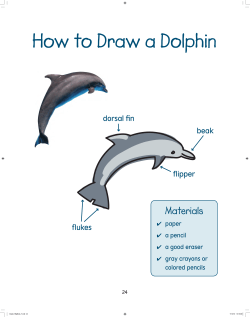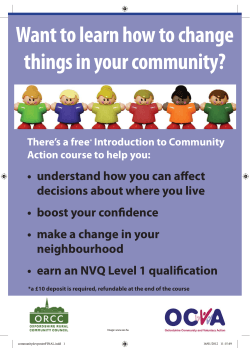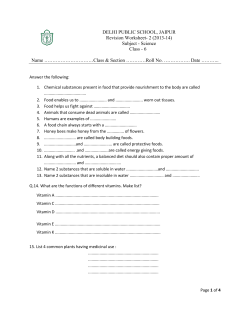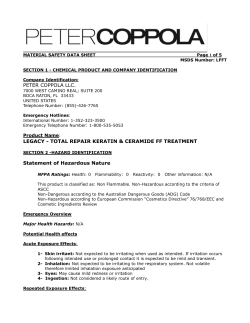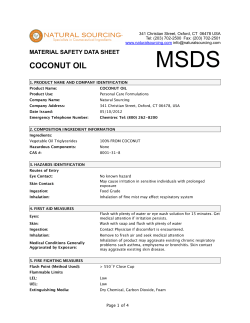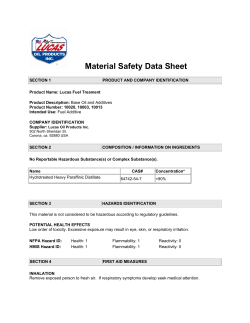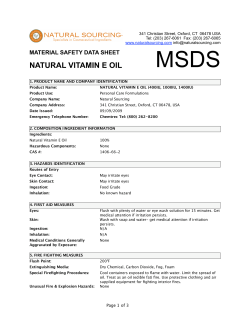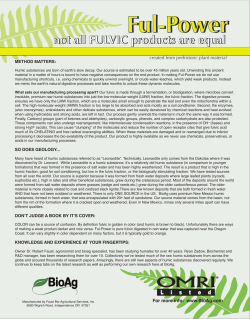
How to work safely with hazardous substances For small businesses
How to work safely with hazardous substances For small businesses 342344-ACC5835-Pressfile.indd 1 19/04/11 12:46 PM Do I need to read this? Does your work involve using any substances that: • are explosive, corrosive or easily ignited? • will cause you or your workers to become ill after either short or long-term exposure? Do you want some influence over your ACC work levies? If you’re unsure or you’ve answered ‘yes’ to either of these questions, you should read this booklet. 342344-ACC5835-Pressfile.indd 2 19/04/11 12:46 PM What are the problems? Many chemicals and other substances used or produced in the workplace can damage your health. A large number of people in a wide range of jobs may be exposed to them. Hazardous substances include chemicals, poisons, explosives and flammable substances. Exposure can happen by breathing them in, through contact with the skin, by splashing, or by swallowing them from unwashed hands. If exposure isn’t prevented, or properly controlled, it can cause serious illness, including cancer, asthma and dermatitis and sometimes even death. When you’re working with hazardous substances – what you don’t know really can hurt you! 1 342344-ACC5835-Pressfile.indd 1 19/04/11 12:46 PM Why should you do something about it? • Fewer injuries mean lower cost to your business and this becomes more apparent with the introduction of experience rating. Under experience rating, eligible businesses and self-employed people, who have lower-than-average injury rates, with better-than-average return-to-work rates, may get a discount on their levies. Those with worse-than-average claims experience may get a loading on their levy. Experience rating recognises and rewards those business owners with good claims experience. It also encourages businesses to prevent injuries in the workplace and when accidents do happen, help injured employees return to work as safely and quickly as possible. For more detailed information about experience rating please go to www.acc.co.nz/er * • The most current research* estimates that 700 to 1,000 people die in New Zealand each year from diseases caused through the work they do. Most of these deaths are from cancer or respiratory illness and they have been caused by exposure to hazardous substances. • Many more people live with these diseases for years and their lives are severely limited by them – they are unable to take part in normal family, sporting and recreational activities. • You or your workers could suffer serious health problems or early death if you are not working safely with these hazardous substances. National Occupational Health and Safety Advisory Committee (NOHSAC). The Burden of Occupational Disease and Injury in New Zealand. November 2004. 2 342344-ACC5835-Pressfile.indd 2 19/04/11 12:46 PM What should you do now? You will need to: 1. List all the hazardous substances that are used in your work. 2. Check with Enviromental Risk Management Authority (ERMA) in case you need to be an Approved Handler to use the substance. Telephone Hazardous Substances Compliance 0800 376 234. 3. Find out if it’s possible to do the job with safer products. 4. Get an MSDS (Material Safety Data Sheet) from your supplier for each product you need to use. 5. Use the MSDS to work out what safety precautions are needed: –– quantity allowed? –– storage needs? –– ventilation requirements? –– safe exposure levels? –– training and safety gear needed? –– emergency procedures? 6. Work out your plan for using the substance safely. 7. Train your workers and make sure they are following the safety plan. 8. Regularly check that exposure levels are safe. 9. Arrange for a doctor to monitor your own and your workers’ health. 10. Have a plan for dealing with accidents and emergencies. Think about: –– fire extinguishers and hoses –– emergency showers or eyewash facilities –– first aid training and equipment –– emergency communications (mobile, radio telephone) –– distance from emergency services –– the safety of customers and visitors. 11. Check the list at the back of this booklet for where to get further advice. 3 342344-ACC5835-Pressfile.indd 3 19/04/11 12:46 PM 342344-ACC5835-Pressfile.indd 4 Do you need a plan for how to deal with accidents and emergencies? Emergency Procedures Do you or your workers feel unwell after working with hazardous substances? Are you or your workers using substances that may be harmful to health? Health Issues Do you use explosives in your workplace? Explosives Do your workers use or mix chemicals or poisons? Does the MSDS say that the substance may be explosive, flammable or harmful to health? Do you use any chemicals or poisons in your workplace? Chemicals and poisons Questions Yes No N/A • Make sure you always have the proper emergency equipment and trained first aiders available • Contact the Department of Labour on 0800 20 90 20 for advice on using the substance • Immediately see a doctor and let them know what substance has been used • Arrange for a doctor to carry out regular checks • Find out if you and your workers need to have regular health checks • Contact the Environmental Risk Management Authority (ERMA) to find out what the law says and how to manage explosives safely. Phone 04 916 2426 or email info@ermanz.govt.nz • Check to make sure safety procedures are always being followed • Provide them with the proper safety gear • Make sure all workers are trained in how to use the substances safely • Find out how to use the substance safely • Follow the MSDS instructions for storage and labelling • Find out if you can do the job without using the chemicals or poisons • Get an Material Safety Data Sheet (MSDS) for each substance and find out what harmful effects it may have • Complete a list of all hazardous substances used Action required Date completed Photocopy for your own use If you answer ‘yes’ to any questions on the checklist, you need to follow the ‘Action required’ and indicate the date you completed it. Hazardous substances safety checklist 4 19/04/11 12:46 PM Where can you get further information or help? Publications The following are some of the publications available from the Department of Labour: • Approved Code of Practice for the Management of Substances Hazardous to Health (MOSHH) in the Place of Work. • Managing Substances Hazardous to Health (MOSHH) – A Brief Guide for Employers. • Workplace Exposure Standards (effective from 2010). Contact the Environmental Risk Management Authority (ERMA) • For publications or advice, phone 04 916 2426 or email info@ermanz.govt.nz. • Website www.ermanz.co.nz • Refer to the list of Hazardous Substance Advisors on the ERMA website for an Advisor in your area. Contact the Department of Labour – Health and Safety • For publications or advice, phone the Workplace Health and Safety Infoline, freephone 0800 20 90 20. • To get help with difficult or technical health and safety problems, use the online Knowledgebase at: www.dol.govt.nz/workplace/knowledgebase/contact Contact ACC • To contact the ACC Injury Prevention team, phone 0800 844 657 or email thinksafe@acc.co.nz 5 342344-ACC5835-Pressfile.indd 5 19/04/11 12:46 PM Notes: 6 342344-ACC5835-Pressfile.indd 6 19/04/11 12:46 PM Notes: 7 342344-ACC5835-Pressfile.indd 7 19/04/11 12:46 PM Notes: 8 342344-ACC5835-Pressfile.indd 8 19/04/11 12:46 PM 342344-ACC5835-Pressfile.indd 9 19/04/11 12:46 PM www.acc.co.nz 0800 844 657 ACC5835 March 2011 ISBN: 978-0-478-36223-7 342344-ACC5835-Pressfile.indd 10 19/04/11 12:46 PM
© Copyright 2025
